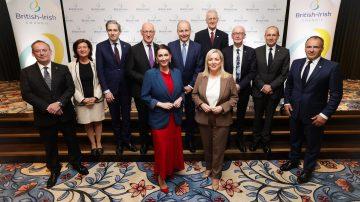Following the conclusion of the COP26 in Glasgow, Guernsey’s Deputies Le Tocq and de Sausmarez reflect on their experiences and takeaway messages while they represented Guernsey at the event.
The aim of the summit was to set the stage for cutting global greenhouse gas emissions steeply enough to limit warming to the Paris Agreement’s 1.5 degrees Celsius above preindustrial levels.
Considering that the global temperature is already at 1.1 degrees above preindustrial norms, the key message to come out of the COP was that the target remains in reach, however urgent action is required globally.
“Guernsey is only small, but it can play a meaningful part in managing global warming”
Deputy Jonathan le Tocq, Guernsey’s Minister responsible for External Relations, said: “The clear message from COP26 is that we are at a turning point for all governments around the world as we see the pace of development and commitments accelerate to ensure that global climate targets are met.
The announcement that the UK and Guernsey had reached an agreement in principle to extend the UK’s ratification of the Paris Agreement to Guernsey was welcome and demonstrates that our policies in relation to climate change are aligned to international standards.
“Guernsey shows global leadership in supporting Green Finance, shifting our dependence on fossil fuels to clean sources of energy and the more sustainable, cyclical use of resources. Guernsey is only small, but it too can play a meaningful part in managing global warming, and indeed we must, both through our domestic actions and through the business we conduct internationally.”
Deputy Lindsay de Sausmarez, President of the Committee for the Environment & Infrastructure whose mandate includes climate change, said: “In my time at the COP26 I took the opportunity to meet with political counterparts in other jurisdictions, plus experts in the fields of green finance, economics, marine ecology, natural capital accounting, climate change legislation, renewable energy, sustainable transport and the built environment among other areas.
“Our climate change policy attracted many compliments for being so rounded and outward facing. Not only does it include mitigation and adaptation, as you’d expect from any climate change policy, but it also incorporates our role as a green and sustainable finance centre and our overseas aid and development programme. Our Strategy for Nature is also an integral part of our overall approach to climate change. It was these features that made a real impression on the people I spoke with.
“What struck those attending most was the urgency of action necessary to keep global warming to within more manageable, less dangerous limits. Government policies have a fundamental role to play with this, not least in facilitating innovation. Policies give industry the confidence they needed to commit to low emission technologies, which in turn then give policymakers the confidence they needed to bring the target date forward.
“We don’t have to wait for all countries to jump aboard with the same solutions in one go”
“Another key takeaway for me was that we don’t have to wait for all countries to jump aboard with the same solutions in one go – indeed, we don’t have time to wait. There is enormous value in different jurisdictions trialling sustainable solutions that they think will work for them: if they do work, that knowledge can be shared, and the solution scaled up and rolled out in other places around the world. That message really struck me as I’m often asked what difference a small place like Guernsey can make on the global scale.
“Another answer to this question is our Overseas Aid & Development programme. Many of the nations most affected by climate change are also among the poorest, and the cruel irony is that they have done the least to contribute to the problem. Our overseas aid can go a long way in helping communities in these regions both mitigate and adapt to the effects of climate change. These regions are also home to some of the world’s most vital ecosystems, such as rainforests, coral reefs and mangroves, which play a globally significant role in our climate and biosphere.
“Overall, I was personally encouraged by the innovation and real-world progress at local and industry levels that was in evidence in many of the conversations beyond the main negotiation rooms. The Committee for the Environment & Infrastructure will review its priorities in light of the outcomes of COP26 over the next few weeks.”

















